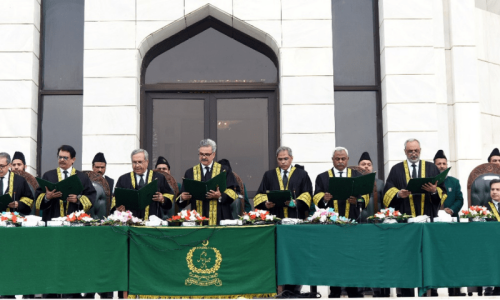ISLAMABAD, June 11: The Rs1.8 billion food subsidy announced in the budget would provide a relief of only Rs2 per month, per head to over 71 million “poor and vulnerable Pakistanis”, budget documents reveal.
This means that a needy person would not be able to purchase even an additional ‘Roti’ in a month.
While reading out the budget speech, Minister of State for Finance Omer Ayub Khan had told the National Assembly that the budget was of “relief and the people”.
The government announced Rs1.2 billion subsidy for the Utility Stores Corporation (USC) to offer a ‘ghee package’ to the people. In addition, about Rs200 million has been allocated for sale of pulses and Rs400 for sale of wheat flour at the USC outlets at subsidised rates. The total food subsidy for 2007-08, thus, comes to Rs1.8 billion.
Officially, Pakistan’s 23.9 per cent population is considered ‘poor’ and another 20.5 per cent ‘vulnerable’ who may fall below poverty line with minor price shocks. As such, the percentage of people living below the poverty line and the vulnerable when put together comes to 44.4 per cent or about 71.2 million of the country’s total population of 160 million.
Assuming that the USC has a network all over the country and its distribution is equitable, the 71.2 million “poor and the vulnerable” would get a benefit of Rs24 per head, per annum.
However, there are only 1,000 utility stores across the country and a large majority of the people do not have access to these stores.
A breakdown suggests that the Rs1.2 billion subsidy on edible oil, when distributed among the poor and the vulnerable, comes to Rs1.40 per person per month or around Rs16 per year.
Similarly, the Rs200 million subsidy proposed for the sale of pulses through the USC network, when calculated, would provide a relief of 23 paisa per person per month or Rs2.8 per year. Likewise, the Rs400 subsidy on flour would mean 47 paisa per head per month or Rs5.6 per annum.
The government has separately decided to reduce by half the flour subsidy being given to the people of the Federally Administered Tribal areas from Rs200 million in the current financial year to Rs110 million next year. On the other hand, subsidy being provided to the people of Gilgit agency on account of wheat, salt and sugar has been increased by over 80 per cent, to Rs541 million from Rs295 million this year.
In total, the government will be providing Rs113.9 billion subsidy next year compared with Rs107.6 billion this year, showing an increase of 5.8 per cent. However, if adjusted against 7.9 per cent inflation, the subsidy would be lower than in the current year.
The Rs113.9 billion subsidy includes Rs7.5 billion for the import of sugar, Rs53 billion for Wapda, Rs19 billion for KESC, Rs13.5 billion for fertiliser import and Rs15 billion for oil companies and refineries.














































